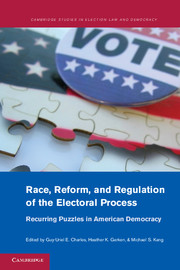Book contents
- Frontmatter
- Contents
- Figures
- Tables
- Contributors
- Preface
- Introduction: The Future of Elections Scholarship
- PART I RACE AND POLITICS
- PART II COURTS AND THE REGULATION OF THE ELECTORAL PROCESS
- Overview: Mapping Election Law's Interior
- 4 The Institutional Turn in Election Law Scholarship
- 5 Judges as Political Regulators
- 6 Empirical Legitimacy and Election Law
- 7 Judging Democracy's Boundaries
- PART III ELECTION PERFORMANCE AND REFORM
- PART IV CONCLUSION
- Index
- References
Overview: Mapping Election Law's Interior
Published online by Cambridge University Press: 01 June 2011
- Frontmatter
- Contents
- Figures
- Tables
- Contributors
- Preface
- Introduction: The Future of Elections Scholarship
- PART I RACE AND POLITICS
- PART II COURTS AND THE REGULATION OF THE ELECTORAL PROCESS
- Overview: Mapping Election Law's Interior
- 4 The Institutional Turn in Election Law Scholarship
- 5 Judges as Political Regulators
- 6 Empirical Legitimacy and Election Law
- 7 Judging Democracy's Boundaries
- PART III ELECTION PERFORMANCE AND REFORM
- PART IV CONCLUSION
- Index
- References
Summary
This chapter is full of innovative and highly individual work. While each piece is valuable on its own, together they form something of a cross-section of contemporary work in election law, providing us with an opportunity to see the interests and ambitions of the field as a whole. After a decade in which theoretical engagement took a bit of a back seat to studying the machinery of elections, the pieces in the chapter reveal a field in which scholars are once again asking big questions about how law interacts with and shapes the practice of democracy. Each piece builds on methodological insights of election law's first generation of theoretical work, which was created to understand how the Supreme Court addresses, and should address, problems like legislative self-dealing and limits on minority representation. But they apply them to new problems, taking the study of election law outside of the confines of the courthouse or even outside of the country, examining questions ranging from how to change the process through which election laws are created in the first place to what form judicial review of election law should take in transitional democracies. Further, they each incorporate new ways of thinking about the bodies that either regulate or are regulated by election law, adding to previous models ideas about how voters develop political opinions, how opinions affect the perceived legitimacy of elections, and how courts decide election cases.
- Type
- Chapter
- Information
- Race, Reform, and Regulation of the Electoral ProcessRecurring Puzzles in American Democracy, pp. 75 - 85Publisher: Cambridge University PressPrint publication year: 2011
References
- 1
- Cited by

